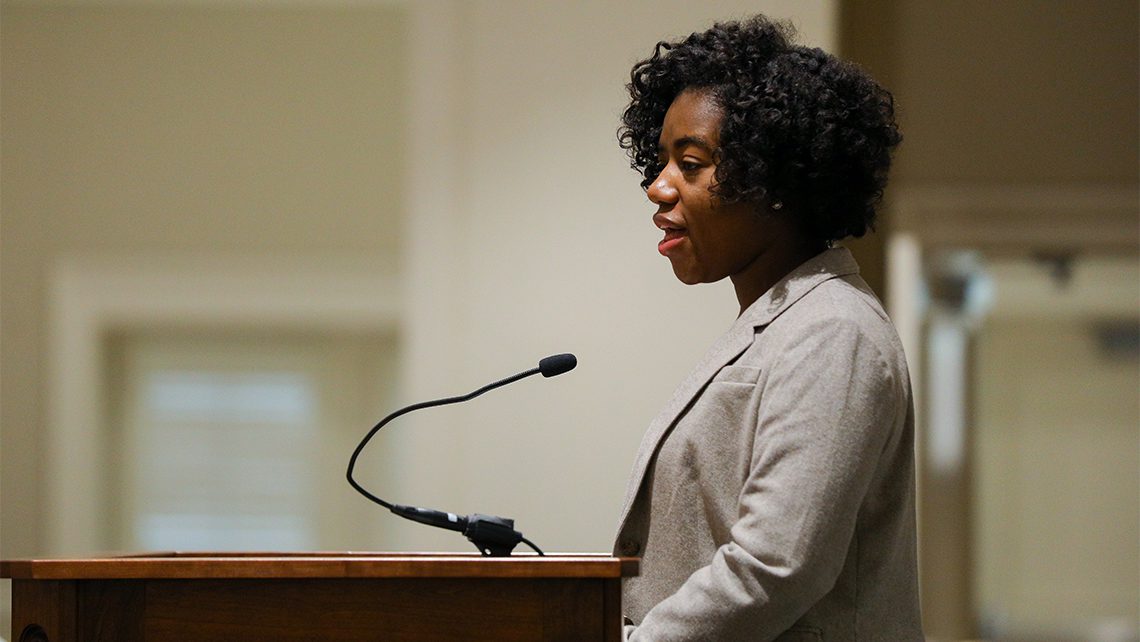Purpose of the celebration

Furman University sponsored a Community Breakfast Jan. 12 as part of a series of events honoring the life and work of Martin Luther King, Jr., “Building the Beloved Community.” The event featured a talk by Naomi Tutu, daughter of South African Archbishop Desmond Tutu, and introductory remarks by sophomore and Furman NAACP president Shekinah Lightner. Here are the remarks by Lightner, a Politics and International Affairs major from Rock Hill.
As we reflect on why our community comes together this morning in celebration of the life and legacy of Dr. Martin Luther King Jr., may we be challenged by the questions posed to us by the Reverend King in his Letter from a Birmingham Jail.
“I have traveled the length and breadth of Alabama, Mississippi, and all the other southern states,” Dr. King wrote. “On sweltering summer days and crisp autumn mornings I have looked at the South’s beautiful churches with their lofty spires pointing heavenward. I have beheld the impressive outlines of her massive religious education buildings. Over and over I have found myself asking: ‘What kind of people worship here? Who is their God? Where were their voices when the lips of Governor Barnett dripped with words of interposition and nullification? Where were they when Governor Wallace gave a clarion call for defiance and hatred? Where were their voices of support when bruised and weary Negro men and women decided to rise from the dark dungeons of complacency to the bright hills of creative protest?’”
Furman may no longer be religiously affiliated and those of us in this room may worship differently, if at all. Yet the questions Dr. King posed still challenge all of us to consider what we believe and value most deeply. Do we truly lead lives that reflect the principles we declare to uphold? We must critically consider our actions when met with modern day versions of Governors Barnett and Wallace. Do we stand up against prejudice, discrimination, and racism or do we cower in the midst of darkness? Because we are afraid. Because we make a decisive choice to live in the bliss of ignorance. Because we no longer believe the light within all of us can drive out the darkness of the few that threaten our unity as a human race?
In essence, what Dr. King entreats us to consider is at the heart of a liberal arts and sciences education. Furman asks us to consider who we are most authentically, what we believe most deeply, and what the world needs from us. Today all of us in this room are Furman students, if only briefly. We must each answer these questions and then act upon them as citizens of Greenville, of South Carolina, of the United States, and of the world. That is why we gather together. Why we pause to think about the ideas being shared with us. It is our purpose here this morning
Because, as Dr. King pointed out, our community needs its citizens to be extremists. It needs citizens who will combat indifference from overtaking good people. It needs citizens who will break through barriers—both real and artificial—that restrain dialogue. It needs citizens who will rebel against the notion that the success of the individual is more important than the success of the community, because the two are inextricably linked. If we accrue success to ourselves at the expense of our fellow citizen, then we lose our community. It needs citizens who fight for justice. But if justice is to “roll down like waters,” we must not tear down one power structure only to replace it with another. Rather, we need citizens who contend for a community in which every person is equal. And to steal a line from the poet Dylan Thomas, our community needs citizens who will “rage, rage against the dying of the light.”